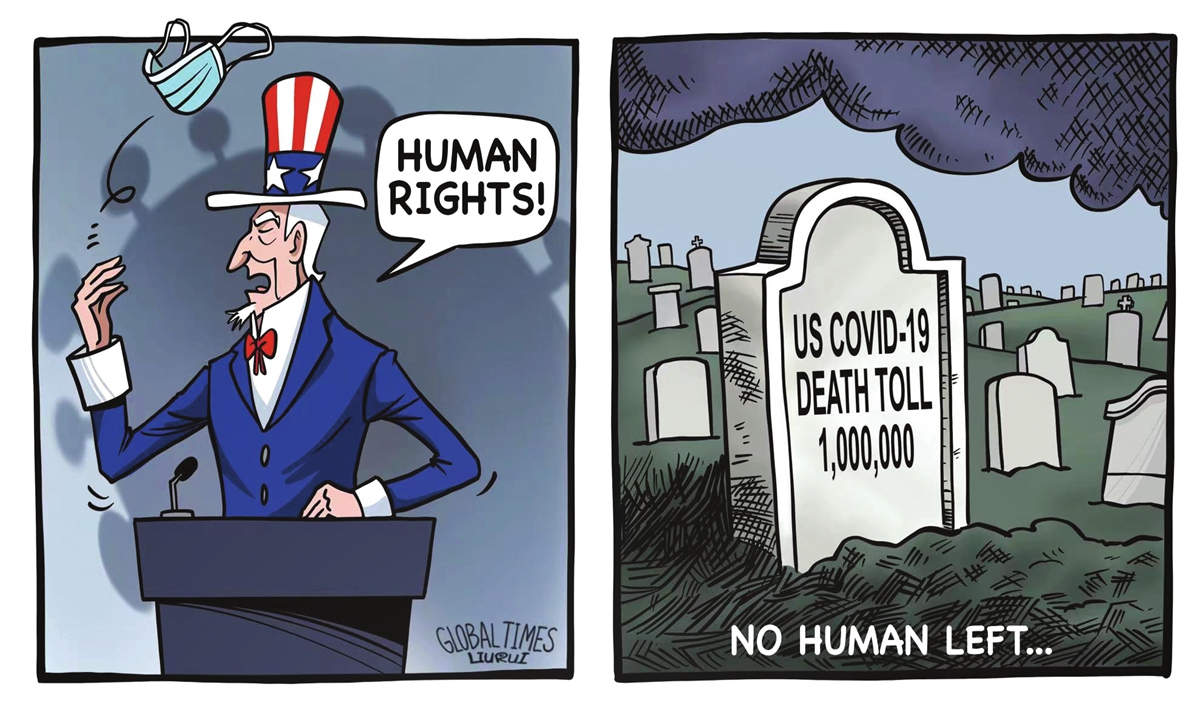
Illustration: Liu Rui/GT
The US is to co-host with other three countries the second global COVID-19 summit virtually on Thursday, following the first one in September 2021. The US' hosting of COVID-19 summits is quite in line with its style of diplomacy and bears a clear resemblance to the Summit for Democracy convened by the US last year.However, the death toll caused by COVID-19 had surpassed 1 million in the US as of May 4, according to data compiled by NBC News. The US has now resigned to its fate, counting on the existing vaccines to be effective against the virus, and hoping that the virus is getting weaker and weaker, Lü Xiang, a research fellow at the Chinese Academy of Social Sciences, told the Global Times.
Yet in this case, there is no indication that the US has invited China, or Russia, to the summit. On the contrary, it is still trying to engage in geopolitical competition with other powers. This shows how inhumane the Biden administration and the policy elites are in dealing with the epidemic control issues. They shout about human rights, freedom and caring for the vulnerable, while staying uncooperative with its so-called rivals when coordination is urgently needed to solve global problems.
Even against such backdrop, China would not criticize the US for hosting an inclusive pandemic summit which is an initiative by the United Nations and run by the US, with the participation of most countries in the world. On April 19, Chinese Foreign Ministry spokesperson Wang Wenbin said during a regular press conference that China welcomes all efforts conducive to promoting international solidarity and science-based response to COVID-19.
But judging from the countries invited by the US, the summit can be described as a "values conference," as only countries with similar ideologies to the US were invited, while those with different ideologies have been vilified, discredited and marginalized.
Meanwhile, as the midterm elections approach, the Biden administration is hoping to cover up the reality that it is fighting the epidemic even worse than its predecessor, by shifting the blame for the COVID-19 pandemic in the US and even globally to its defined geopolitical opponents. In this way, it is trying to meet the demands of the US domestic election agenda. The summit, a meeting of consolation, is used to prove that the US is still capable on this issue, and the fact that the epidemic killed more than 1 million people is not a failure of the US government or of the political system, Lü noted.
In addition, to date the US has not released details of any new pledges it will bring to the summit. The administration's request for an additional $22.5 billion in COVID-19 response money, including $5 billion for global pandemic funding, has been stuck for weeks largely because of Republican lawmakers.
Since Joe Biden took office, the epidemic in the US has been out of control several times, and the funds invested are at least trillions. With the domestic epidemic in turmoil, if the Biden administration spends billions or more to help foreign countries combat the epidemic, there will be strong domestic opposition, which is the last thing that the Biden team wants to see. So the US hosts a summit, which does not require much money or contribution and could demonstrate US leadership to the world. Meanwhile, the US could show the world that it is indispensable in international affairs.
But the fact is that the US is not only unable to prove itself when it comes to the epidemic control, but also has a bad reputation in many global issues. It cannot extricate itself from the Russia-Ukraine crisis, while it is trying to mess up the situation in the Asia-Pacific region. How can the US contribute to the global fight against the pandemic?
Interestingly, the US invited a number of private companies to attend the summit, including Soros' Open Society Foundations and the Bill & Melinda Gates Foundation. This is quite American. It is very difficult to get the stingy US government to give out money, but the government often calls on private companies to contribute. However, the private sector is all for profit. Although Soros and other private business owners may make some commitments in the global fight against the pandemic, it is impossible to expect them to address such global problems. This is because private owners have limited capacity and they may hope to reshape the political situation in the target area through their involvement and donations.
The US often drags in entrepreneurs and foundations to make donations in the global fight against the pandemic. This makes it as if private companies engage in "color revolutions" in other countries under the banner of vaccine sharing. This will turn the fight against the pandemic into something tragic. Therefore, it can be said that the COVID-19 summit is only a tool used by the US to save grace, the contributions it will make are finite.
The article was compiled by a Global Times reporter based on an interview with Lü Xiang, a research fellow at the Chinese Academy of Social Sciences. opinion@globaltimes.com.cn

